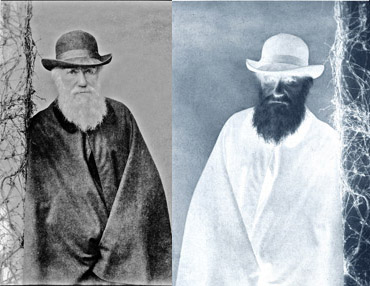![]()
Más confusión, la trampa ha funcionado (nuevos capítulos del artículo titulado Economía semántica para la manipulación del conocimiento: la palabra Evolución y su uso como trampa en “On the Origin of Species by Means of Natural Selection, or the Preservation of Favoured Races in the Struggle for Life”)

Continúa aquí el artículo titulado “Economía semántica para la manipulación del conocimiento: la palabra Evolución y su uso como trampa en “On the Origin of Species by Means of Natural Selection, or the Preservation of Favoured Races in the Struggle for Life””. El comienzo de este artículo se encuentra aquí. El artículo completo aquí.
°º¤ø,¸¸,ø¤º°`°º¤ø,¸¸,ø¤º°`°º¤ø,¸¸,ø¤º°`°º¤°º¤ø,¸¸,ø¤º°`°º¤ø,¸¸,ø¤º°`°º¤ø,¸¸,ø¤º°`°º¤
4. Segundo párrafo: Más confusión
Dos párrafos más adelante encontramos más confusión en un largo párrafo:
Everyone who believes in slow and gradual evolution, will of course admit that specific changes may have been as abrupt and as great as any single variation which we meet with under nature, or even under domestication. But as species are more variable when domesticated or cultivated than under their natural conditions, it is not probable that such great and abrupt variations have often occurred under nature, as are known occasionally to arise under domestication. Of these latter variations several may be attributed to reversion; and the characters which thus reappear were, it is probable, in many cases at first gained in a gradual manner. A still greater number must be called monstrosities, such as six-fingered men, porcupine men, Ancon sheep, Niata cattle, etc.; and as they are widely different in character from natural species, they throw very little light on our subject. Excluding such cases of abrupt variations, the few which remain would at best constitute, if found in a state of nature, doubtful species, closely related to their parental types.
Largo párrafo cuya primera frase es incomprensible:
Everyone who believes in slow and gradual evolution, will of course admit that specific changes may have been as abrupt and as great as any single variation which we meet with under nature, or even under domestication
¿Qué significa to believe in slow and gradual evolution? ¿Qué significa specific changes? ¿Qué extraña relación puede haber entre slow and gradual evolution en la primera parte y as abrupt and as great as any single variation, en la segunda?, ¿Acaso no es slow and gradual, lo contrario de as abrupt and as great?
A continuación una confusa frase con tres partículas de probabilidad en dos líneas:
Of these latter variations several may be attributed to reversion; and the characters which thus reappear were, it is probable, in many cases at first gained in a gradual manner
Pero el objetivo lo vemos más claro en el análisis del tercer párrafo.
5. Tercer párrafo: La trampa ha funcionado
Más adelante en el mismo capítulo nos encontramos:
My reasons for doubting whether natural species have changed as abruptly as have occasionally domestic races, and for entirely disbelieving that they have changed in the wonderful manner indicated by Mr. Mivart, are as follows. According to our experience, abrupt and strongly marked variations occur in our domesticated productions, singly and at rather long intervals of time. If such occurred under nature, they would be liable, as formerly explained, to be lost by accidental causes of destruction and by subsequent intercrossing; and so it is known to be under domestication, unless abrupt variations of this kind are specially preserved and separated by the care of man. Hence, in order that a new species should suddenly appear in the manner supposed by Mr. Mivart, it is almost necessary to believe, in opposition to all analogy, that several wonderfully changed individuals appeared simultaneously within the same district. This difficulty, as in the case of unconscious selection by man, is avoided on the theory of gradual evolution, through the preservation of a large number of individuals, which varied more or less in any favourable direction, and of the destruction of a large number which varied in an opposite manner.
Aquí el autor expresa sus razones para dudar que las especies hayan cambiado abruptamente y no creer en procesos espectaculares como los que propone Mivart. Su análisis muestra el uso de expresiones indefinidas (abrupt, abruptly, suddenly), subjetivas (wonderful manner, wonderfully) o de verbos poco apropiados en un texto científico (believe, disbelieve).
El argumento prometido es incompleto, inconsistente por referirse continuamente a las variaciones en estado de domesticación, y remite a otras partes de la obra:
If such occurred under nature, they would be liable, as formerly explained, to be lost by accidental causes of destruction and by subsequent intercrossing
Lo importante es que el párrafo ha cumplido su misión. El concepto tan sólido que era evolución se ha convertido ahora en otro: theory of gradual evolution (by natural selection, of course). La trampa ha funcionado.
Continuará…………….
El artículo completo se encuentra aquí.
